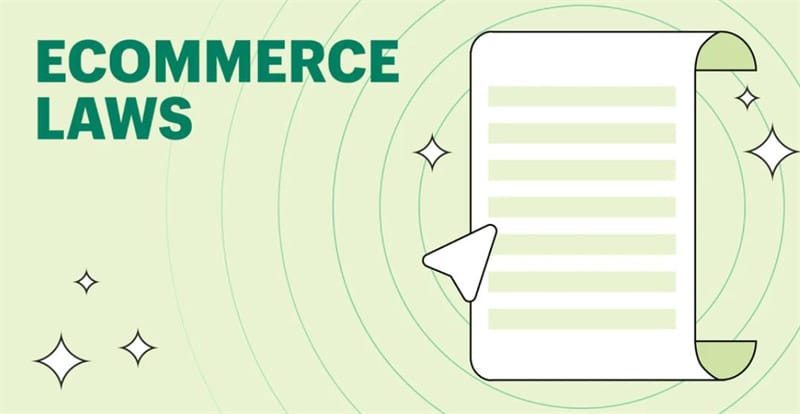
Online commerce has been revolutionized by digital marketplaces. One need only click a button to launch an online store. Although marketplaces normally handle online legal restrictions, what happens when it is your responsibility to adhere to the rules and regulations of online selling?
There are a number of legal requirements that must be met before you can begin selling online.
Since we don't want any of our readers to get involved in illegal internet sales, we've provided some resources for making sure your transactions stay inside the law.
What Is Ecommerce Law?

When it comes to the law, there are a number of factors that can make or break an online retailer. Each sort of eCommerce firm must follow by particular rules and regulations, just like any other business, and failing to do so can result in legal troubles and litigation.
While retail eCommerce giants like Amazon or Walmart, and service-based shops like Uber and Lyft, definitely have an army of eCommerce attorneys ready to face any difficulty, it’s not as easy for small and medium-sized eCommerce enterprises owing to budgetary limits. In light of this, let's examine a few of the laws that govern the operation of eCommerce businesses.
Ecommerce Laws Every Business Needs to Know
If you own an online store, you need to protect yourself and your business by talking to a lawyer who specializes in eCommerce law and an insurance agent. Meanwhile, we've done our best to lay out the rules and statutes with which you should get acquainted and consult an expert.
1. Forming a Business Entity
In order to protect themselves, one of the best things an online store can do is to establish a limited liability company (LLC). Creating a limited liability company (LLC) establishes a distinct corporate entity from its owners. If the business were to ever run into financial difficulties, the owners' private assets would be shielded from being liquidated to pay off creditors.
Creditors of the LLC can thus seize its funds and other assets if the LLC is unable to meet its financial obligations. However, the owners' private property and finances are safe from being taken. LLC members can lose no more than their initial investment. A lawyer who focuses in electronic commerce law should be consulted because, as with any rule, there may be exceptions.
2. Paying Taxes

The only two things in life that can be counted on are death and taxes, as famously remarked by Benjamin Franklin. Online stores must apply for a tax ID and research their options for avoiding or claiming sales taxes and acquiring resale certificates. Before opening a business in a new nation or state, it's crucial to familiarize oneself with the local tax laws and procedures.
For clarit, let's say that the majority of your customers are located in the United States. In this case, you'll want to list your process before taxes, as is customary in the United States. If Australia is your target market, where customers are accustomed to seeing post-tax pricing, the tax should be included in the advertised price.
Depending on the goods being sold and the location from which the sales are made, taxes apply to a number of other aspects of online sales. The following are only a few examples:
- Clothing sales in New York are subject to the state's sales tax.
- Value-added tax is charged on all non-essential purchases made in the United Kingdom (VAT).
- In addition to sales tax, every plastic bottle sold in California also incurs a recycling fee of $0.11.
- This is just one more reason why consulting a tax professional is essential before opening up shop online.
3. Pick a Reliable Payment Processing Service
Following a successful transaction, how would you prefer to be compensated? While there are many options for accepting payments, not all of them are made equal. When deciding on a payment processor, keep these things in mind in order to not to get scammed.
- Is it hosted or non-hosted?
- Does it have security measures to prevent fraud?
- What kinds of product limitations exist, if any?
- Where can I get the details of any associated transaction, termination, monthly, or initialization charges?
- When problems arise with taking payments, what is their policy on chargebacks and holdbacks?
4. Applying Trademarks, Patents, and Copyrights
However, despite the fact that they are sometimes used interchangeably, both terms have significant differences. The United States Patent and Trademark Office provides the following definitions.
- One party's right to use a certain term, phrase, symbol, or design to identify and differentiate their goods from those of others is known as a trademark.
- Patent: A limited term property right pertaining to an invention, issued by the United States Patent and Trademark Office in exchange for public disclosure of the innovation.
- Written or performed works of art, as well as musical compositions and visual works, are all safeguarded by copyright laws.
- You could wish to submit an application for one, many, or all of these, depending on what it is that you're selling. It's not required, but most online merchants will take steps to safeguard and manage their IP in order to maintain a competitive edge. Even if you do not, you should at least check to make sure you’re not infringing on other company’s patents or trademarks; for example, if you sell mobile phone covers with an unauthorised Mickey Mouse on them, you’re probably going to get in some hot water with Disney.
5. Selection of Inventory Quantity
Products you have stashed in your attic or garage could be all you need to send. However, there is always the chance that your company may expand beyond what you can lawfully manage from your own home. Check your lease, deed, or local zoning laws to determine whether you're able to legally run an online store from your house if you plan to store a lot of merchandise there.
eak out; there's no need to close up shop just yet. Consider working with a third-party logistics (3PL) provider like The Fulfillment Lab, or renting warehouse space. Your company may benefit from our storage and order fulfillment outsourcing services by reclaiming valuable floor space and gaining access to our cutting-edge technology and knowledgeable fulfillment staff. Furthermore, we have negotiated discounted prices with carriers and ship items through fewer shipping zones, saving you money.
One more thing, now chatbots are into the game, they can be very useful into the Selection of Inventory Quantity.
6. Accepting Age Limits

Every every website is obligated to follow the COPPA guidelines (COPPA). The law that is most likely to harm your online store is the one that says you can't gather any information on a customer who is younger than 13.
- For a more in-depth examination of COPPA rules, consider whether or not your product is designed specifically for kids.
- If your product is an age-restricted item for adults, you’ll need to verify your country’s unique rules and follow age verification processes.
7. Getting a Company Insured
You should get small business insurance to shield yourself and your company from any lawsuits. To find out which policy is ideal for your company's needs, it's advisable to consult with an insurance agent that specializes in working with small businesses in your area. Here are a few types of insurance to think about purchasing:
- The costs associated with defending a claim that your company was responsible for damage to another person's property or harm to that person are partially covered by general liability insurance.
- You really need product liability insurance if you're selling anything risky like CBD, e-cigarettes, or medical equipment.
- Malpractice, mistakes, and carelessness are all things that can harm a firm.
- Liability insurance for businesses protects them from financial ruin in the event that their products or services cause someone else physical harm or damage to their reputation.
In Conclusion
It is crucial to your company's success and the safety of the clients you gain that you fully grasp the consequences of internet business legislation.
Get familiar with the tax, payment security, copyright, data gathering and usage, and licensing necessities of your sector before launching an e-commerce firm.
All of it could seem like a lot at first. This information and the expense of hiring a motorcycle lawyer will protect your company from legal disasters and unnecessary losses in the future.
Author Bio: Aabhas is the founder of Avija Digital a complete digital PR agency for online Strategy and Marketing, Expert in providing consultation as a content strategist for SaaS and tech brands. He begun his career in digital marketing in 2016, which continues to this day. He spends his free time in the gym, playing board games, and learning new technologies in IT sector.










